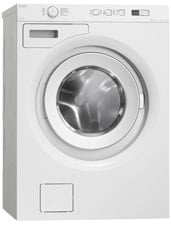Being located in the city, we have customers looking for the ability to have the convenience of their own washer and dryer, but don’t have the capability of venting their dryer to the outside. A condensation or ventless dryer doesnt require a vent, because it turns moisture into water. The water can be sent through the washer waste line.
Condensation dryers can solve a lot of problems, particularly because they require minimal installation. You don’t need to worry about cutting holes in the walls, the hassle of accommodating a vent, or even certain building requirements and laws for venting (especially the historic preservation concerns in cities). Only European companies like Miele, Bosch and Asko produce this type of dryer
Condenser vs Regular Venting
Condensation dryers are considered “compact”. Compact laundry is handy in tight spaces such as closets or under counters in a kitchen. They are typically about 24 inches wide and 24 inches deep, compared to standard, full size washer and dryers at typically 27 wide by roughly 31 inches deep. The options for compact laundry and ventless are very slim, but they are available. I always tell my customers that venting is definitely the best and most effective type of drying system. In general you could spend less money on a full size washer and dryer. In addition there are a lot more options as well as larger capacity machines, if you can vent. So buy full size if you can.
Washer/Condenser Dryer vs Combination Washer and Dryer
This is no contest for two reasons. First, the drying takes forever in the combination, because the drying on a combination is 110 volt instead of 220 volt. Secondly, combinations are notoriously unreliable and really should only be used as a last resort like a boat or as a second laundry set.
Bosch
Bosch is a division of the giant Robert Bosch company in Germany. Bosch is certainly our most popular compact washer and dryer brand. I would say most likely because they are reasonably priced, and most reliable after Miele. They will offer a 1-year warranty. Bosch will only be manufacturing condenser dryers as of February 2013.
Asko
Asko is a brand with limited distribution. They have changed hands quite a bit over the years. They started as Swedish Asea, then were bought by the Italian Merloni company. Now they are part of the Slovenian Goranje company.
Asko vs Bosch Compact with Condenser Dryer
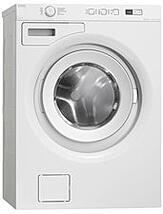 |
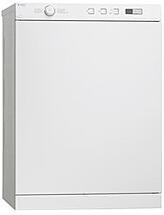 |
|
Asko Washer W6424
|
Asko Condensation Dryer T754CW
|
|
VS
|
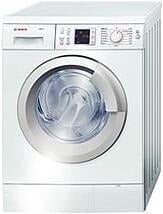 |
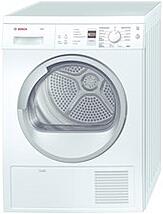 |
|
Bosch Washer WAS24460UC
|
Bosch Condensation Dryer WTE86300US
|
|
|
Asko Washer W6424 - $1349.99
- Available in Stainless or White
- 10 Cycles
- 7 Rinse Options
- 1200 RPM Spin Speed
- 2.1 Cubic Ft. Stainless Drum
- Internal Water Heater: Thermister electronic thermostat that ensures accurate temperature management within ½ degree. Along with Auto Wash, that will automatically adjust the temperature, based, on the amount of clothes, and soil level.
- Coin Trap
- Memory Recall
- No Spin Option
Asko Condensation Dryer T754CW - $1199
- Available in Stainless or White
- 6 Drying Programs
- Exclusive “Butter Fly Drying Technology”: Handles load w/ maximum gentleness which retains clothes natural colors, and also make the dryer last a longer.
- Ball Bearing Suspension System, Heavy Duty Life Tested Motor.
- 3.9 Cubic Ft. Stainless Drum
- Automatic Moisture Senor: minimizes static-cling-less ironing.
- Double Lint Filter
- Optional Retractable Iron Board, Accessory, sold separately.
|
|
Bosch Washer WAS24460UC - $1349.99
- 15 Wash Cycles
- 8 Temperature Options
- LED Display
- Anti Vibration System: reduces vibration by 30%.
- 1200 RPM Spin Speed
- Internal Water Heater: offers hotter washing cycles, to kill bacteria and get a better clean
- Quick Wash Option
- Energy Star
- Self Clean Detergent Dispenser
- 2.2 Cubic Ft. Stainless Drum
Bosch Condensation Dryer WTE86300US - $1179.99
- 11 Cycles
- Temperature Options
- Internal Light
- 3.9 Cubic Ft. Stainless Drum
- Time Dry
|
Overall both brands offer great products. Asko’s internal washer temperature will be one of the hottest in the industry, with specific cycles, for tough stains, or linens, much like what you’d expect from a hotel. In addition, they are a little less deep than the Bosch ideal for under counter applications. This would only make a difference, if the installation were in a kitchen, under countertops, or installed side by side. Asko would then be flush with the cabinetry.
Bosch is more reasonably priced and consistently reliable. In this case, Bosch is much more reliable than Asko and will require 30% less service in the first year. Bosch would be my choice unless it is placed under a counter...and even then it would still be a consideration.
Additional Resources
For more information, read the Yale Compact Laundry Buying Guide with information, facts and useful insider buying tips about your compact laundry options. Over 20,000 people have read a Yale Guide.

 |
Jessica Goodale is an Appliance Sales Consultant at Yale Appliance + Lighting. Jessica has recently become a new mother and enjoys singing, dancing and participating in local theater.
Read more about Jessica here.
|

